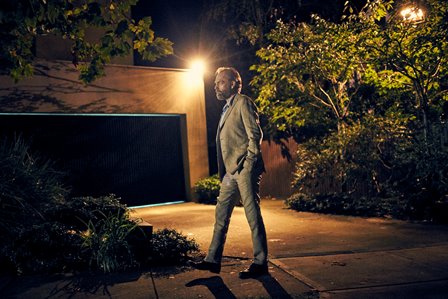Hugo Weaving as Dr Alex Klima.
Seven Types of Ambiguity, a six-part drama produced by Matchbox Pictures and set to air on the ABC, weaves together different perspectives of a child kidnapping, exploring the nature of love and relationships.
Matchbox’s Tony Ayres first read Elliot Perlman’s novel, on which the show is based, around five years ago, just after he'd finished up on The Slap.
He was struck by the structural similarities between the two stories, while also noting the differences in the ways they had used the form.
“It was such a challenging and compelling book. I found it very rich and rewarding, frustrating and exciting,” Ayres told IF.
“It was one of those big, ambitious projects that entices you as a producer.”
A six-part series shot in and around Melbourne, Ayres described Seven Types of Ambiguity as “a relationship drama, wrapped in a mystery.”
“I think the series really captures the spirit of the book, which is around questions of the unknowable; the nature of love, life in modern society, and how we deal with relationships, how we deal with each other,” said Ayres.
Each episode follows a different person’s perspective of the circumstances surrounding the kidnapping of a seven year-old boy after school.
However, Ayres was quick to point out that the show is not a story about a missing child. He called it a “whydunnit” – focused on the truth behind what happened and the complexities of the relationships involved.
Early on, the audience discovers that the kidnapper, Simon, played by Xavier Samuel, is actually a former lover of the child’s mother (Leeanna Walsman).
At the same time, Simon’s accomplice, Angela, played by Andrea Demetriades, is revealed to be involved with the child’s father, Joe – played by Alex Dimitriades.
Seven Types of Ambiguity will also see Hugo Weaving return to the small screen, playing Simon’s psychiatrist Dr Alex Klima.
It was the first time Ayres had worked with Weaving, whom he says he has admired from afar for a long time.
“He’s so masterful as an actor,” he said. “He’s just very skilled and very generous to other actors, and with a strong critical eye.”
Other cast members include Anthony Hayes and Susie Porter. Overall, Ayres said he couldn’t fault a single performance: “They’ve all really embraced the material.”
Developing Perlman’s novel into a television series was a lengthy process. After ABC TV picked the project up, Ayres enlisted Amanda Higgs to join him as an executive producer.
Together they grappled, along with the writing team – led by Jacquelin Perske, along with Marieke Hardy and Jonathan Gavin – with how to best adapt the novel, which doesn’t always follow a linear storyline. Perlman also assisted with the creative process.
Perske, who is an executive producer on the project as well as lead writer, told IF that Perlman was a great collaborator and “brains trust”, helping to suggest what could be jettisoned and what had to stay.
“It’s always hard adapting a book or any original source. Particularly a book you really love and you respect, because at a certain point you can’t keep everything you love about it. You have to make decisions and you have to extricate the story.”
Perske said that, in order to drive the story on screen, it has been shaped into more of a thriller. However, the focus remains on the relationships between the characters.
The nature of those relationships is what drew the strong cast of actors to the show, said Perske, noting that they had good responses to the script.
“People seemed very keen to want to play these characters, which makes you feel very pleased,” she says.
Indeed, it was the characters and their relationships that appealed to Perske herself, when Ayres and Higgs approached her about the project.
“They’re contemporary characters – there was nothing particularly unusual about them, but they’re placed in a very unusual situation,” she said.
The show sees relationships that “look operational and functional” unravel.
Overall, Perske says Seven Types of Ambiguity is a story about love. “I know that’s quite general, but it does seem to be the connective word; love at its absolute best and also love when it is absolutely destructive and terrible.”
Perske said that Ayres and Higgs established a strong team, which has meant production has been smooth sailing.
The series is directed by Glendyn Ivin, Ana Kokkinos and Matthew Saville, shooting two episodes each.
Perske told IF that having three directors works quite well, with each episode about a different character and almost a self-contained entity.
Ayres said the look and feel of the show was stunning: “It’s really beautiful, but it’s also very personal and distinctive.”



